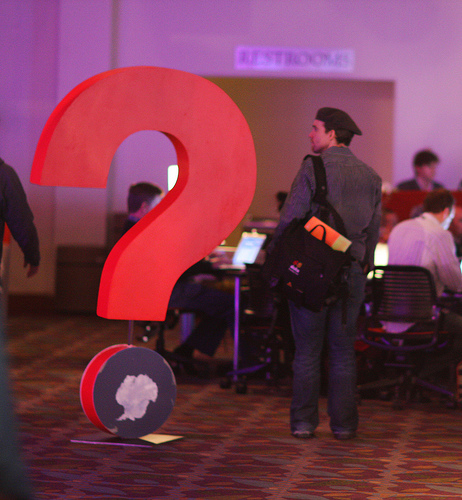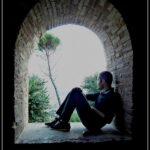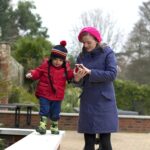It is not the answer that enlightens, but the question. – Eugène Ionesco
What does that mean?
This is an interesting quote in that it turns a few things around from the usual way we think of them. The quote says it’s the question that gives us the enlightenment, not the answer. Could it really work this way?
I puzzled over that for a little bit, but I think I have a possible answer. I have actually used this method before, but didn’t realize it. Yes, it sounds silly, but you have probably had it work for you as well.
To ask a question, you have to think about what you are going to say. You have to provide some background regarding your puzzle, and you have to state the nature of what you don’t understand. Then you ask for an answer.
In being so careful about setting up the background and asking the question, you often find your answer simply by clearing your mind of the clutter of trying to find your solution. In that moment of clarity, the solution is often sitting there, waiting for you to find it.
Why are questions important?
Questions are very powerful tools. If we don’t ask questions, we will have trouble learning much of anything, right? See how I worked a question into the last sentence, and this one too? By asking questions of ourselves, we force our minds to go back over the data and get it organized.
I have found that this method often provides it’s own answer. If you put your mind to it, you can probably remember seeing this trick used in movies and on TV. Someone is trying to explain their problem to someone else, and suddenly they understand, and run off to do what they need to do.
Questions are part of our life when we are growing. If you don’t believe me, spend some time with a Preschool or kindergarten age child. Most of the sentences that come from their mouths are in the form of questions. Often just one word long, the most common being “Why?”
Where can I apply this in my life?
Try to gather everything you *do* know, and spend some time focused on that instead. If you focus on what you do not know, what will you learn? So review what you know and see where that leads you. If nothing magical happens, try the next step.
Take the information you have and find someone to discus it with, even if (or some might suggest especially if) they do not know the subject matter. The less they know, the more you have to explain, and that’s the kind of memory jogging we’re looking for in this method.
It’s kind of interesting, because I have regularly used this method my son, both when he was a toddler and now that he’s a teen, as well as my daughter. The amazing thing is how well it works, at least for me. How well does it work for you? Can you think of a time when you worked out a problem using this method?
Even if you have tried the method and it didn’t work for you, questions are still powerful tools. You will still answer a great many questions simply by asking them of yourself. You will get answers when you ask questions, won’t you? (Do you see what I did there?)
And, to me, that is the whole point of the quote. By asking a question, you manage to become enlightened (at least a tiny little bit). The answer is perfunctory, and hard to get without the question. How but the question focuses the mind on what is important.
To put it a slightly different way, have you ever asked a really poorly worded question and gotten a completely useless answer? I know I have. Then, frustrated with that answer, have you formed a better question and received a better answer?
After a few iterations, suddenly there are clear and useful answers flowing. You asked the same question at the beginning, but the answer wasn’t very useful. By working until you found a good question, you became enlightened.
The quality of your life will almost certainly be in direct proportion to the quality of your questions. Make every question count!
From: Twitter, @AR_Foundation
confirmed at : http://www.brainyquote.com/quotes/quotes/e/eugeneione109171.html
Photo by Erik Charlton








Ah, trying to make practical explanations of the imponderable. Yet another exercise in getting answers, Nice try.
It’s what I do here. I ponder, and then I type. But what is your question? 8)
This really kinda got me thinking. I’ve had all these questions lately, and I’ve been so angry trying to find the answers. Thanks!